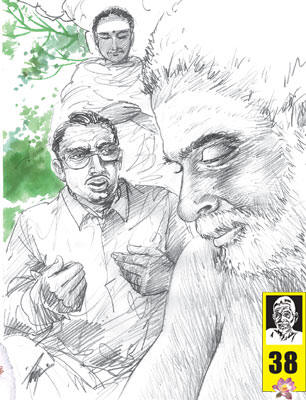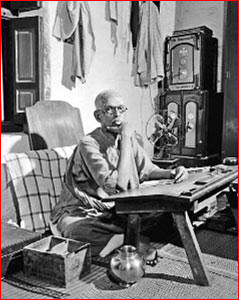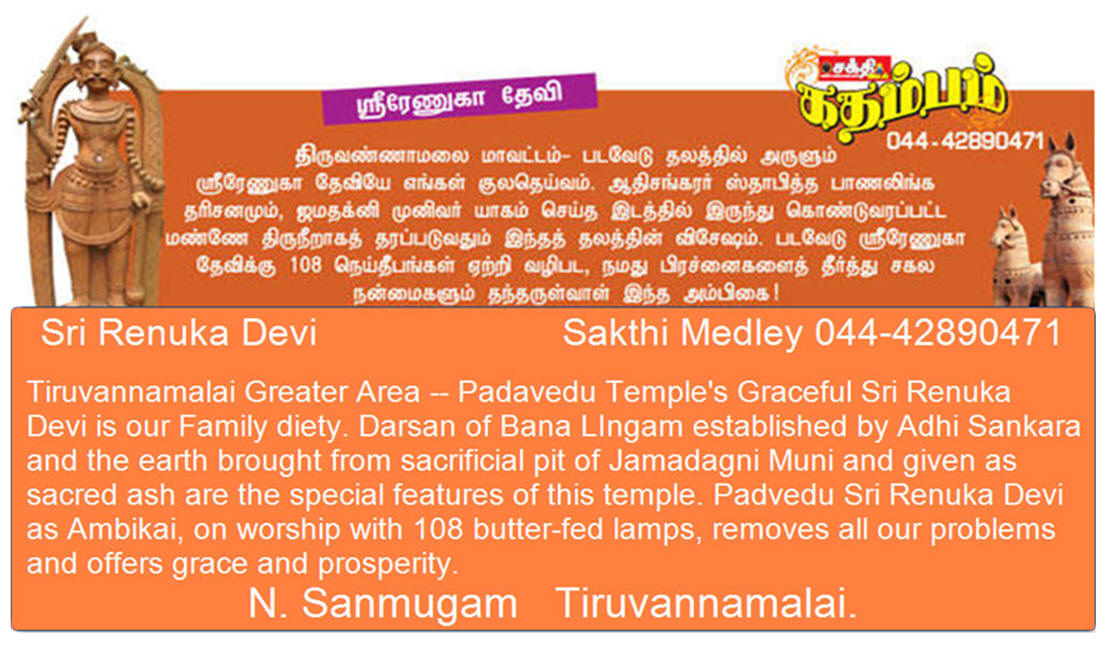38Ramanamaharishi
சக்தி விகடன் -
20 Sep, 2011
Once, the District Collector and his assistant came to visit with
Bhagavan. Where there is power, the official feels he is eminently
qualified to give advice.
He wants to be in the forefront with bombast and bluster. The collector
rattled off his erudition in spiritual matters and what he liked in his
perusal. He spoke at length. The Assistant Collector too spoke at length
about his body tingling with spiritual experiences.
Bhagavan did not utter one word during their harangue.
He did not express alternate views. He listened to them with
patience…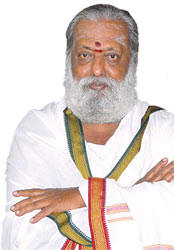 Seeing Bhagavan remaining silent, they had the feeling whether they
should be more lucid in their presentation. They talked again and
explicated their presentation. They came to the end giving the
impression, they exhausted everything. They became quiet. Bhagavan kept
a careful watch on them; they were tired and blinking.
Seeing Bhagavan remaining silent, they had the feeling whether they
should be more lucid in their presentation. They talked again and
explicated their presentation. They came to the end giving the
impression, they exhausted everything. They became quiet. Bhagavan kept
a careful watch on them; they were tired and blinking.
The collector addressed Bhagavan, “We spoke at length. You did not
respond to us. Why?” Bhagavan spoke, “I was speaking to you in my
language (of silence); you did not have the inclination to hear me.” The
collector, intelligent as he is, understood it in a flash. It became
clear to them they spoke beyond their heft.
They quietly left.
Ramanatha Brahmachari
a student with lean frame in Tiruvannamalai Vedic School came to the
Virūpākṣi cave and met with Bhagavan. Even at his first sight, he was
drawn to Bhagavan. He understood he was standing before a stupendous
persona. Staying close to him and rendering helpful service to him were
his past birth’s auspicious fruits, he thought happily.
Some people are bogged down with family burden and seek peace and relief
from financial ruin. There are rich people with financial stability,
develop a sense of spiritual enquiry and go to Bhagavan. There are
working people with spiritual pursuits, coming to Bhagavan. But,
Ramanatha Brahmachari expecting nothing from Bhagavan was convinced that
his birth’s goal was to remain in Bhagavan’s Sannidhi in a wonderful
place like the Virūpākṣi cave.
Remaining close to Bhagavan, he helped him. Vedic School provided meals
on the premises. He refused to accept food there but went from house to
house asking for alms. He ate the food and shared it with Bhagavan who
accepted it gladly.
Once, taking the food obtained by begging and going up the mountain, he
came across his father who asked for the food. Brahmachari refused to
give him the food, went up the mountain and presented the food to
Bhagavan.
Bhagavan said, “Only after you offer the food to your father, I will eat
it.” According to the wish of Bhagavan, he went down the hill, met with
his father and told him, “Come, let us go up the mountain. Bhagavan and
you can eat the food.”
But, Brahmachari’s father refused to go up the mountain. Not knowing
what to do, he went to Bhagavan. Bhagavan said, “Go feed your father and
come back. I will eat the food.” Would Brahmachary become a paragon of
virtue by refusing food to his father and feeding the Guru?
Not possible. Bhagavan impressed on Brahmachari this tenet of ‘Māthā.
Pithā,
Guru, Daivam’ in that order (Mother, father, Guru and God). Service to
Māthā and comes first and later others. Jñāni knows what his relative
position in the totem pole. A genuine Guru will not accept his
preeminence above the parents.
He will instruct this tenet to his devotee in a subtle manner.
Bhagavan did that. Since that day, Brahmachari gave food first to his
father before he gave it to Bhagavan.
Brahmachari is a youth with a subtle sense. Besides doing Guru service,
he served Bhagavan’s devotees: He cleaned their place, gave them food
and water, dispensed them medicines where needed and then went to
Bhagavan’s Sannidhāṉam.
For Brahmachari, there was no spiritual enquiry or sitting before the
Guru and remaining in meditation. It is all physical service to Guru:
running all over serving all was important to him.
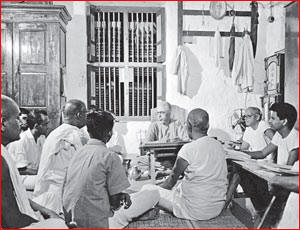
For half hour, he spoke quoting Sanskrit Slokas on Guru Devotion. When
the moderator told him his time was up, he got an extension and
continued speaking. When he was reminded a second time that his time was
up, he requested more time. He elaborated for two hours on subjects of
Sanskrit Slokas, Tamil poems, the experience of others and himself and
Guru Bakthi. How did this happen. Bhagavan’s spirit was guiding him. It
was Bhagavan as the Guru who prompted the reticent Brahmachary inside
him to speak on Guru Bakthi in his presence.
Ramanatha Brahmachari caught bubonic plague with blisters all over his
body. The blisters broke discharging blood and pus. He could not lift
his head. He was in a state of collapse.
The devotees fearing spread of contagion decided to go to Pacchaiamman
temple. They told of their decision and promised to send food to
Brahmachari.
“That is fine. Send food for him and me too. I will stay here and look
after him,” said Bhagavan.
The devotees could not transgress his wishes. Some stayed in the
Virūpākṣi cave. Some went to Pacchaiamman temple. Being near Bhagavan,
Ramanatha Brahmachari recovered from his illness.
Let us get Darśan.
